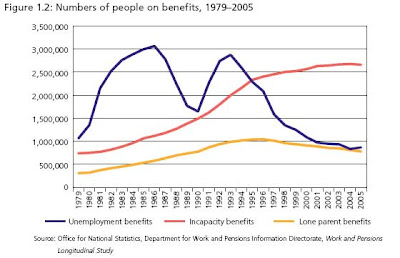
She also has 8 kids from two failed marriages, and "her family pocket more than £20,000 a year in handouts, even though none of them has done a day's work this century. They pay NOTHING for their three-bed house, which boasts a new ultra-modern kitchen."
Alison, 38, lives with her lover Ian Hurditch, 40, in Beeston, Nottingham. Sadly, Mr Hurditch has an unusual back condition which prevents him taking paid employment. True, it did abate long enough for him to erect a new porch for their house. And it must have also let up enough for him to father Alison's ninth child, which she is now carrying. But paid work is out of the question.
First, Alison's not at all grateful for the support we taxpayers give her: in fact, she's incensed we're so niggardly. Those £10 Boots gift vouchers we send each of her kids at Christmas? "Rubbish - you can't get anything decent for that from Boots."
The second point is that her kids are her meal ticket. Thanks to Labour's grandiose and half-baked plan to "eradicate child poverty", each one means big money.
And Alison is an expert on entitlements (no doubt assisted by the summary benefit rate card helpfully provided by her local authority). Right now, she's working to have one son diagnosed as "socially backward", which will mean she can cop a special £2,366-a-year handout. And she's trying to have another diagnosed with Attention Deficit Hyperactivity Disorder, which will deliver more housing points and force town hall chiefs to meet her demands for a bigger home. As she says:
"My sister has nine kids and the council gave her two houses knocked into one. Then she moved to Cornwall and the new council bought a private house for them. I don't know why they can't do that here."
It's as simple as that: the more kids she has, the more cash she gets:
"I love giving birth - it's always so quick for me. People say I should stop breeding but it's not their business."
Not their business? Even though they're the ones having to pay?
Is your blood boiling yet?
OK, let's remind ourselves of the big picture.
There are currently 5.4m people of working age who are not working but drawing benefits instead- ie being supported by us taxpayers. They cost us £16bn pa in benefit payments alone*, plus the further cost of lost tax revenue. And despite endless programmes and pledges to get them into work, their number has remained roughly unchanged since 2000 (see this blog on the hopeless New Deal).
The major benefits they draw are for unemployment (Jobseekers), incapacity, and lone parenting.
Traditionally, unemployment benefit dominated. But that's declined sharply from the levels recorded in the 1980s and early 1990s. These days, Government figures show that by far the most widespread benefit is Incapacity Benefit (IB), with 2.7m recipients.

Now, as everyone surely knows, many of these IB claimants are actually disguised unemployed. In terms of "incapacity" they are typically men with "bad backs", and women with "depression", both conditions which it is apparently impossible to diagnose objectively. And they are heavily concentrated in three weak economy areas- Scotland, Wales, and the North of England. Those areas together account for 50% of IB claimants, even though they only account for 37% of the overall population.
Precisely how many IB recipients are capable of work is unknown. In 2005, the Department for Work and Pensions estimated around one million, with Labour proposing they should somehow be found jobs (A new deal for welfare: Empowering people to work). On that basis the real unemployment figure- ie working age people who could be working but are claiming benefit instead- is around 2m.
That still leaves out of account "lone" welfare parents like Alison who could in theory work. Plus various other able-bodied groups included in the 5.4m total.
Overall, it seems reasonable to assume that at least half of these 5.4m welfare dependents could work- call it 2.5-3m who could be supporting themselves rather than sponging off the rest of us.
So why don't they?
Is it because there are no jobs?
At first blush, you might think that was a big part of the explanation. But after 15 years of economic growth, the facts say otherwise. For example, 0.7m of these people (14.4% of the working age population) live in London, where it is absurd to argue job shortage: indeed such is London's demand for labour, a net 400,000 immigrants have been sucked in over the last five years alone. A further 0.9m live in the East and South East, where the argument is nearly as absurd.
In Alison Goulding's area, the East Midlands, there are 0.4m non-working but working age welfare claimants (13.6% of the working age population). Yet in five years, labour shortage has sucked in a net 64,000 immigrants. And even in the supposedly severely incapacitated North East, there was net immigration of 13,000- taking jobs which could have been filled by locals.
Clearly there's something else going on here. And that something else of course is the curse of welfare dependency.
If Alison and her back-challenged boyfriend went out to work, by the sound of it, they'd be looking at the minimum wage. On that basis, if they both worked a full-time 35 hour week, they'd gross a combined £20 grand pa.
But since they're already getting £20 grand pa net, why would they bother? After all, they've already got careers producing kids and knocking up porches. What's more, instead of going out on a cold wet morning to wait for the bus to work, they can sit at home in the warm watching the Jeremy Kyle Show on the big screen telly. Work is not a rational option.
Last week at the Public Accounts Committee, the DWP's Permanent Secretary was asked if the government's New Deal welfare to work programme would get better results if there was a bit less carrot and a bit more stick (see this blog). Predictably, he declined to answer the question, but he did admit that many benefits are "not sanctionable"- ie recipients can go on drawing them irrespective of whether they cooperate with attempts to get them a job. There are no consequences.
And what life chances will any of her nine kids have? I think we know the answer- at best, they will become the welfare dependents and porch builders of the future; at worst, they could end up inside.
Let's take it as read that there is no magic bullet. But the current welfare system for people of working age is a social and fiscal disaster.
So what to do?
As a minimum, we should abandon the arbitrary and wildly unrealistic definition of poverty as 60% of median income, and revert to the traditional 50%. Nobody would starve at that level and it would hugely increase the relative attractiveness of paid employment. What's more, it would save taxpayers about £50bn pa, or £2 grand pa per British household (see this blog- £50bn equals abolishing Inheritance Tax and slashing 13 pence off the standard rate of Income Tax).
In addition, Frank Field's four key welfare reforms (blogged here) are all worth pursuing:
-
- welfare benefits to be time limited, as under Clinton's reforms in the US
-
- authority over welfare spending to be localised- closer to the coal face (again cf US)
-
- incapacity benefit to be decided by local officials, not doctors, but current recipients to retain benefit for a year after finding paid work
- immigration to be tightly controlled so more jobs can go to current welfare recipients already here
Painless? In the short-term, no. But nobody has come up with a real world alternative. And unless we implement a radical programme along these lines we'll find ourselves dealing with more and more Alisons.
And her children.
All the way to eternity.
PS Yes, we realise there is another highly seductive approach, in the shape of the Citizens Basic Income. But sadly, we still hasn't found a way of making the sums add up (see this blog). We must get back to work on that.
*Footnote- do you think £16bn pa as the benefits cost of these people sounds too little? We do too. It is the figure calculated by the NAO, but against stories like Alison's it feels very light. We know there are around 3m households like hers that are workless and living on benefits. And if they all get £20 grand pa, that adds up to £60bn. Even halving it gives £30bn. We suspect the NAO has omitted some key items- we will investigate further.